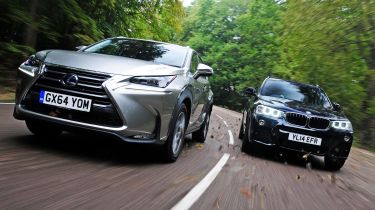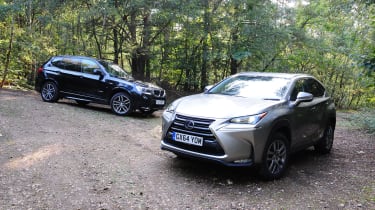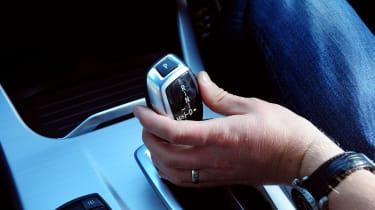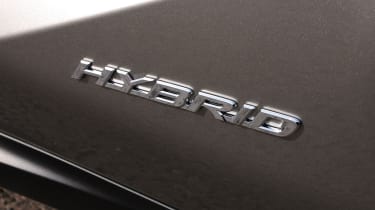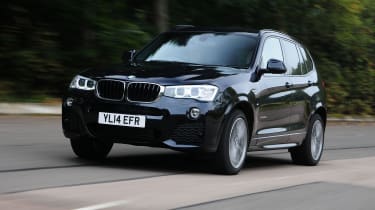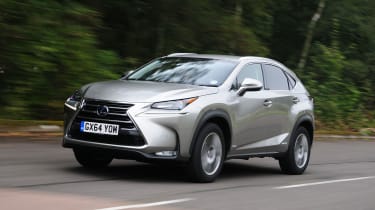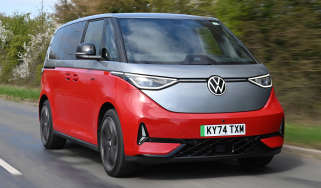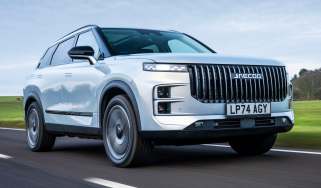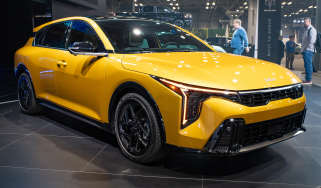Lexus NX vs BMW X3
Lexus is looking to conquer the compact SUV class with its new NX 300h hybrid. We see how it fares against BMW’s recently revised X3
Lexus has arrived late to the compact SUV party, but there’s no denying its all-new NX is making a big entrance. Inspired by the head-turning LF-NX concept car, the bold newcomer certainly attracts attention. And with sales of upmarket off-roaders hitting an all-time high, the Japanese brand is hoping that the NX’s outlandish lines prove a big hit.
The NX is equally adventurous under the skin, where it packs an advanced petrol-electric hybrid drivetrain that aims to deliver unrivalled performance and refinement. More importantly, the hi-tech mechanicals promise excellent efficiency.
With CO2 emissions from 116g/km, the NX will be popular with company car drivers looking for reduced Benefit in Kind bills, while claimed fuel returns of over 50mpg are almost unheard of for a high-riding SUV.
However, the Lexus isn’t the only upmarket off-roader with one eye on the bottom line, because the rugged yet composed BMW X3 has recently been refreshed. With tweaked looks and a revised 2.0-litre diesel engine, the all-wheel-drive car promises to be as desirable as it is cost effective. And that’s not all, because like all BMWs, it should be great to drive and provide class-leading performance.
Used - available now
So, which of our compact SUVs takes the spoils in this bruising encounter? Read individual reviews by clicking the links above, and read on to find out the verdict...
Head-to-head
Off-road
Both the NX and the X3 get raised ride heights and tough SUV styling cues, but neither is really at home in the rough stuff. Even so, the BMW’s permanent all-wheel-drive transmission and hill descent control make it far more capable than the Lexus, which struggled on our off-road route. The main culprit is the electrically powered rear axle, which doesn’t have enough torque to scrabble up steep inclines.
Gearboxes
On paper, the Lexus’ CVT gearbox promises to maximise performance and efficiency by using its theoretically limitless ratios to always be in the right gear at the right time. Yet in the real world, it can’t match the BMW’s eight-speed auto for response, refinement and control.
Benefit in Kind bills
If you’re looking to slash your company car costs, then the Lexus is a tempting proposition. Not only does it boast CO2 emissions of just 116g/km in its two-wheel-drive guise, it doesn’t attract the three per cent BIK surcharge applied to conventional, diesel-engined rivals.
Verdict
1st place: BMW X3
The X3’s facelift is subtle, but does enough to keep it ahead in this encounter. Rugged looks, a smart cabin and a composed driving experience are real highlights, while the extra room for passengers and loads makes it a more practical choice. It can’t match the Lexus when it comes to low company car costs, but a stronger fuel return, excellent residuals and great-value servicing work in the X3’s financial favour.
2nd place: Lexus NX
Bold looks and extremely competitive Benefit in Kind bills are the new NX’s main calling cards. It’s also beautifully built and loaded with standard equipment. Yet the newcomer is undermined by its lacklustre hybrid powerplant, uninspiring handling and poor fuel economy. And despite its raised ride height and four-wheel-drive layout, the Lexus has extremely limited off-road ability.
Lexus NX vs BMW X3: key specs
| BMW X3 xDrive20d M Sport | Lexus NX 300h Luxury | |
| On the road price/total as tested | £38,645/£41,375 | £34,495/£37,135 |
| Residual value (after 3yrs/30,000) | £21,293/55.1% | £16,834/48.8% |
| Depreciation | £17,352 | £17,661 |
| Annual tax liability std/higher rate | £1,769/£3,538 | £1,171/£2,342 |
| Annual fuel cost (12k/20k miles) | £1,949/£3,249 | £2,416/£4,026 |
| Ins. group/quote/road tax band/cost | 31/£459/E/£130 | 31/£436/D/£110 |
| Cost of 1st/2nd/3rd service | £425 (5yrs 50,000) | TBC |
| Length/wheelbase | 4,657/2,810mm | 4,630/2,660mm |
| Height/width | 1,678/1,881mm | 1,645/1,845mm |
| Engine | 4cyl in-line/1,995cc | 4cyl/2,494cc/105kW elec |
| Peak power | 187/4,000 bhp/rpm | 192/5,700 bhp/rpm |
| Peak torque | 400/1,750 Nm/rpm | 210/4,200 Nm/rpm |
| Transmission | 8-spd auto/4wd | eCVT auto/4wd |
| Fuel tank capacity/spare wheel | 67 litres/run flat | 56 litres/space saver |
| Boot capacity (seats up/down) | 550/1,600 litres | 475/1,520 litres |
| Kerbweight/payload/towing weight | 1,745/620/2,000kg | 1,785/610/1,500kg |
| Turning circle/drag coefficient | 11.9 metres/0.33Cd | 11.4 metres/0.33Cd |
| Basic warranty (miles)/recovery | 3yrs (unltd)/3yrs | 3yrs (60,000)/3yrs |
| Service intervals/UK dealers | Variable miles (1yr)/153 | 10,000 miles (1yr)/51 |
| Driver Power manufacturer/dealer pos. | 10th/22nd | 4th/1st |
| NCAP: Adult/child/ped./assist/stars | 88/83/53/71/5 | N/A |
| 0-60/30-70mph | 8.3/8.2 secs | 8.7/8.5 secs |
| 30-50mph in 3rd/4th | 3.4/3.8 secs | 3.4 secs (in kickdown) |
| 50-70mph in 5th/6th | 7.5/9.1 secs | 5.1 secs (in kickdown) |
| Top speed/rpm at 70mph | 130mph/1,750rpm | 112mph/2,000rpm |
| Braking 70-0/60-0/30-0mph | 46.7/33.3/9.0m | 49.2/35.9/9.3m |
| Noise levels outside/idle/30/70mph | 72/46/62/68dB | N/A/N/A/62/68dB |
| Auto Express econ (mpg/mpl)/range | 36.8/8.1/542 | 28.7/6.3/354 miles |
| Govt urban/extra-urban/combined | 49.6/56.5/52.3mpg | 53.3/55.4/54.3mpg |
| Govt urban/extra-urban/combined | 10.9/12.4/11.5mpl | 11.7/12.2/11.9mpl |
| Actual/claimed CO2/tax bracket | 206/138g/km/23% | 227/121g/km/17% |
| Airbags/Isofix/parking sens/camera | Six/yes/yes/£330 | Eight/yes/yes/yes |
| Automatic box/stability/cruise control | Yes/yes/yes | Yes/yes/yes |
| Climate control/leather/heated seats | Yes/yes/yes | Yes/yes/yes |
| Metallic paint/LED lights/keyless go | £645/£1,600/£495 | £645/yes/yes |
| Sat-nav/USB/DAB radio/Bluetooth | £900/yes/yes/yes | £995/yes/yes/yes |
